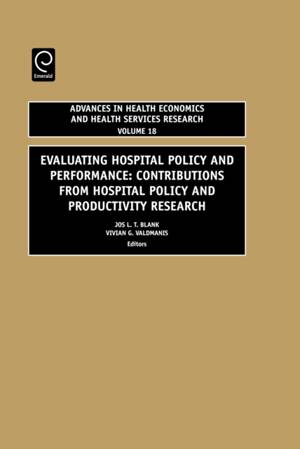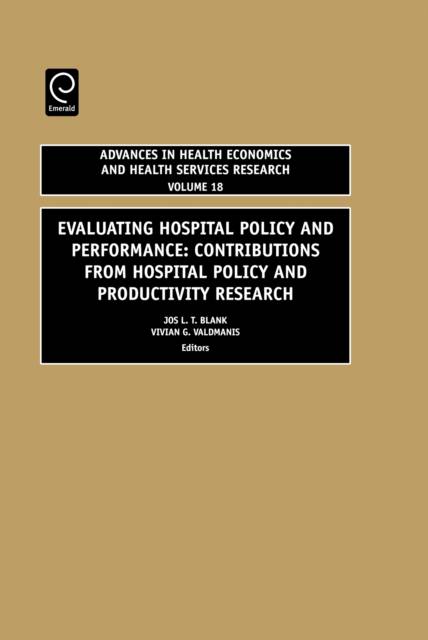
- Afhalen na 1 uur in een winkel met voorraad
- Gratis thuislevering in België vanaf € 30
- Ruim aanbod met 7 miljoen producten
- Afhalen na 1 uur in een winkel met voorraad
- Gratis thuislevering in België vanaf € 30
- Ruim aanbod met 7 miljoen producten
Zoeken
Evaluating Hospital Policy and Performance
Contributions from Hospital Policy and Productivity Research
Blank
€ 299,95
+ 599 punten
Omschrijving
Hospitals worldwide command the majority of any countries health care budget. Reasons for these higher costs include the aging of the population requiring more intensive health care treatments provided in hospitals, the relatively high costs of labor in this labor intensive industry and payment systems that may encourage inefficient behavior on the part of hospital managers and physicians. Governments are seeking to instruments to mitigate this cost rise. Liberalizing hospital markets, deregulation, changing budget systems and changing ownership are only a few examples of attempts to make hospitals more efficient. Hospital industry responds in various ways to changing market conditions and legislation. In most western hospital markets we observe hospital consolidation, acquisitions, mergers and the founding of several types of network and hospital associations. The question is whether this trend also contributes to more efficiency. In this volume a number of outstanding internationally known scholars in the field of productivity measurement and health economics provide the reader with an excellent insight in the complexity of the issue. They explain that there is no straightforward panacea or recipe for the issues addressed. It is shown that the composition of the demand for care, the economic context, environmental and geographical conditions affect the outcomes. Policymakers should therefore take these nuances into account. A policy of increasing productivity starts with knowledge and insights in the complexity of the issue. The book therefore advocates the development of a strategy of collecting relevant data and conducting academic research that meet the standard of the state of the art. The book provides two illustrative examples of such a strategy in Finland and Australia. The authors have avoided as much as possible the technical jargon and complex mathematics and statistics involved in this research area. Therefore the book is par excellence suitable for policymakers and hospital managers, as well as for graduate students of health economics and health administration. It avoids, as much as possible, technical jargon and complex mathematics and statistics. It has international in scope.
Specificaties
Betrokkenen
- Auteur(s):
- Uitgeverij:
Inhoud
- Aantal bladzijden:
- 270
- Taal:
- Engels
- Reeks:
- Reeksnummer:
- nr. 18
Eigenschappen
- Productcode (EAN):
- 9780762314539
- Verschijningsdatum:
- 6/12/2007
- Uitvoering:
- Hardcover
- Formaat:
- Genaaid
- Afmetingen:
- 161 mm x 233 mm
- Gewicht:
- 512 g

Alleen bij Standaard Boekhandel
+ 599 punten op je klantenkaart van Standaard Boekhandel
Beoordelingen
We publiceren alleen reviews die voldoen aan de voorwaarden voor reviews. Bekijk onze voorwaarden voor reviews.








